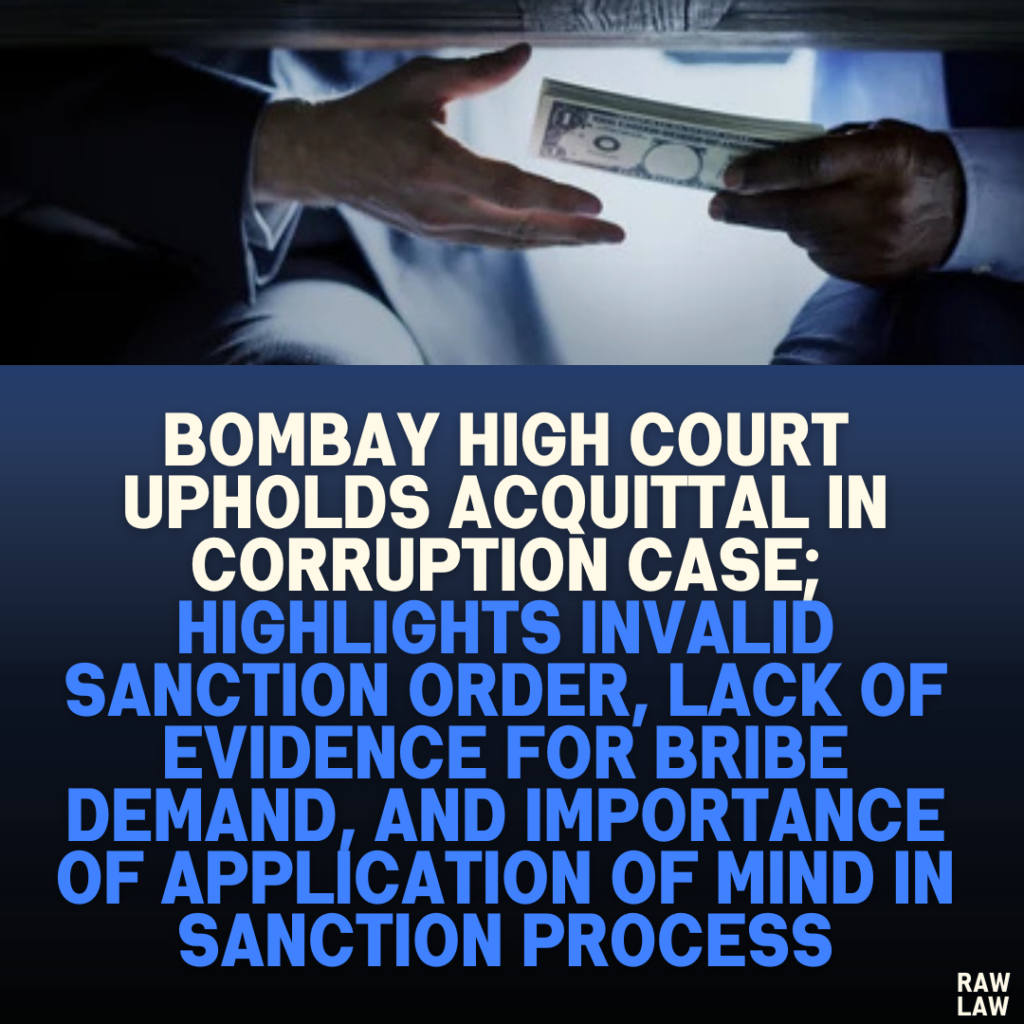Court’s Decision
The Bombay High Court upheld the acquittal of the accused, finding significant procedural lapses in the sanction process and discrepancies in the prosecution’s evidence. The court emphasized the statutory necessity of proper application of mind by the sanctioning authority and raised concerns over the complainant’s credibility and motives.
Facts
The case arose from allegations of corruption against an Extension Officer working with the Panchayat Samiti, Kurduwadi. The complainant, a Junior Engineer, alleged that the accused demanded a bribe of ₹15,000 to issue a Completion Certificate and relieve him from his duties. This certificate was necessary for the complainant to claim his salary and entitlements. After a negotiation, the amount was allegedly reduced to ₹5,000, leading to a complaint filed with the Anti-Corruption Bureau (ACB).
A trap was organized, and ₹5,000 was recovered from the accused at a canteen. The accused claimed that the money was part of ticket sales proceeds from a charity event. The trial court found the accused not guilty, citing inconsistencies in the evidence, prompting the State to appeal.
Issues
- Sanction Validity: Was the prosecution initiated based on a valid sanction from the competent authority?
- Demand and Acceptance of Bribe: Did the prosecution establish the accused’s demand and acceptance of the bribe beyond a reasonable doubt?
Petitioner’s Arguments
The prosecution presented evidence alleging:
- Demand and Acceptance: The complainant’s testimony detailed four instances of bribe demands. On the trap day, the accused allegedly accepted ₹5,000, corroborated by traces of anthracene powder on his hands and recovery of marked currency notes.
- Sanction Order Validity: The sanctioning authority (PW-1) granted permission to prosecute after reviewing the material on record, including pre- and post-trap panchnamas.
The prosecution also argued that delays in lodging the complaint did not weaken the case, as the complainant acted upon persistent bribe demands.
Respondent’s Arguments
The accused and his counsel countered the prosecution’s claims:
- Invalid Sanction: The sanction order was issued without proper scrutiny of relevant materials. The Sanctioning Authority admitted during cross-examination that:
- He did not review the complainant’s office file.
- The order was signed on a pre-drafted format, leaving critical gaps in application of mind.
- Defense Against Bribe Allegations:
- The recovered money was from ticket sales for a charity event, not a bribe.
- The accused was on sanctioned leave during the period when several alleged bribe demands occurred.
- Discrepancies in Evidence:
- Cash amounts in pre- and post-trap panchnamas were unchanged, undermining the credibility of evidence.
- The logbook showed the accused and relevant officials were not present at the alleged locations on the claimed dates of bribe demands.
Analysis of the Law
The High Court examined the case through the lens of procedural compliance under the Prevention of Corruption Act, 1988. It noted:
- A valid sanction requires thorough application of mind by the sanctioning authority.
- Supreme Court Precedents: The court referred to C.S. Krishnamurthy v. State of Karnataka and Neeraj Dutta v. State (Govt. of NCT Delhi), reiterating that demand and acceptance of a bribe are essential elements to establish guilt under corruption laws.
The court criticized the prosecution for failing to provide a convincing trail of evidence. It found that the sanction order lacked credibility as the authority did not independently verify critical aspects, such as whether the complainant completed the tasks for which the certificate was allegedly withheld.
Precedent Analysis
The court extensively discussed precedents to substantiate its reasoning:
- C.S. Krishnamurthy v. State of Karnataka: Application of mind by the sanctioning authority is a prerequisite for a valid sanction.
- Neeraj Dutta v. State (Govt. of NCT Delhi): Mere recovery of money is insufficient; demand and acceptance must be proved beyond doubt.
- State of Karnataka v. Chandrasha: Affirmed the evidentiary standards required to convict public servants under anti-corruption laws.
Court’s Reasoning
- Sanction Order Deficiencies:
- The sanctioning authority (PW-1) admitted to signing a pre-drafted order without scrutinizing the complainant’s official records or assessing the context of allegations.
- The absence of crucial documents like the “B” file (complainant’s office records) cast doubts on the thoroughness of the sanctioning process.
- Inconsistent Evidence:
- The unchanged cash amounts in the pre- and post-trap panchnamas suggested procedural lapses.
- Testimonies of defense witnesses, including the logbook entries, demonstrated that the accused was not present at key locations during the alleged bribe demands.
- Complainant’s Motives:
- The court observed that the complainant faced departmental proceedings and could not substantiate claims of completing pending work. This raised questions about his credibility and potential motive for implicating the accused.
- Delayed Complaint:
- The complainant waited almost a month after the initial demand before approaching the ACB, which the court found unreasonable and indicative of ulterior motives.
Conclusion
The High Court upheld the trial court’s acquittal of the accused, emphasizing the invalidity of the sanction order and serious evidentiary gaps. The court ruled that the prosecution failed to prove demand and acceptance of the bribe beyond a reasonable doubt.
Implications
This judgment underscores:
- The necessity for meticulous compliance with procedural safeguards in corruption cases.
- The importance of a valid sanction grounded in thorough scrutiny by the sanctioning authority.
- Courts’ critical role in ensuring that allegations against public servants are supported by robust and credible evidence.



